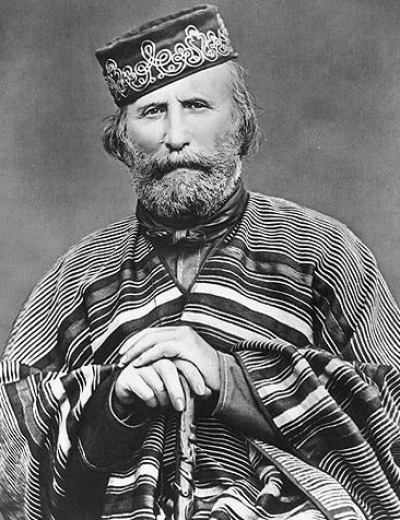The Kingdom of the Two Sicilies (Neapolitan: Regno d''e Ddoje Sicilie; Sicilian: Regnu d Dui Sicili; Italian: Regno delle Due Sicilie; Spanish: Reino de las Dos Sicilias) was a kingdom in Southern Italy from 1816 to 1860. The kingdom was the largest sovereign state by population and size in Italy before Italian unification, comprising Sicily and all of the Italian Peninsula south of the Papal States, which covered most of the area of today's Mezzogiorno.
The kingdom was formed when the Kingdom of Sicily merged with the Kingdom of Naples, which was officially also known as the Kingdom of Sicily. Since both kingdoms were named Sicily, they were collectively known as the "Two Sicilies" (Utraque Sicilia, literally "both Sicilies"), and the unified kingdom adopted this name. The king of the Two Sicilies was overthrown by Giuseppe Garibaldi in 1860, after which the people voted in a plebiscite to join the Savoyard Kingdom of Sardinia. The annexation of the Kingdom of the Two Sicilies completed the first phase of Italian unification, and the new Kingdom of Italy was proclaimed in 1861.
The Two Sicilies were heavily agricultural, like the other Italian states.
Giuseppe Maria Garibaldi ( GARR-ib-AWL-dee, Italian: [dʒuˈzɛppe ɡariˈbaldi] (listen); 4 July 1807 – 2 June 1882) was an Italian general, patriot, revolutionary and republican. He contributed to Italian unification and the creation of the Kingdom of Italy. He is considered one of the greatest generals of modern times and one of Italy's "fathers of the fatherland", along with Camillo Benso, Count of Cavour, Victor Emmanuel II of Italy and Giuseppe Mazzini. Garibaldi is also known as the "Hero of the Two Worlds" because of his military enterprises in South America and Europe.Garibaldi was a follower of the Italian nationalist Mazzini and embraced the republican nationalism of the Young Italy movement. He became a supporter of Italian unification under a democratic republican government. However, breaking with Mazzini, he pragmatically allied himself with the monarchist Cavour and Kingdom of Piedmont-Sardinia in the struggle for independence, subordinating his republican ideals to his nationalist ones until Italy was unified. After participating in an uprising in Piedmont, he was sentenced to death, but escaped and sailed to South America, where he spent 14 years in exile, during which he took part in several wars and learnt the art of guerrilla warfare. In 1835 he joined the rebels known as the Ragamuffins (farrapos), in the Ragamuffin War in Brazil, and took up their cause of establishing the Riograndense Republic and later the Catarinense Republic. Garibaldi also became involved in the Uruguayan Civil War, raising an Italian force known as Redshirts, and is still celebrated as an important contributor to Uruguay's reconstitution.
In 1848, Garibaldi returned to Italy and commanded and fought in military campaigns that eventually led to Italian unification. The provisional government of Milan made him a general and the Minister of War promoted him to General of the Roman Republic in 1849. When the war of independence broke out in April 1859, he led his Hunters of the Alps in the capture of major cities in Lombardy, including Varese and Como, and reached the frontier of South Tyrol; the war ended with the acquisition of Lombardy. The following year, he led the Expedition of the Thousand on behalf of and with the consent of Victor Emmanuel II. The expedition was a success and concluded with the annexation of Sicily, Southern Italy, Marche and Umbria to the Kingdom of Sardinia before the creation of a unified Kingdom of Italy on 17 March 1861. His last military campaign took place during the Franco-Prussian War as commander of the Army of the Vosges.
Garibaldi became an international figurehead for national independence and republican ideals, and is considered by the twentieth-century historiography and popular culture as Italy's greatest national hero. He was showered with admiration and praise by many intellectuals and political figures, including Abraham Lincoln, William Brown, Francesco de Sanctis, Victor Hugo, Alexandre Dumas, George Sand, Charles Dickens, Friedrich Engels and Che Guevara. Historian A. J. P. Taylor called him "the only wholly admirable figure in modern history". In the popular telling of his story, he is associated with the red shirts that his volunteers, the Garibaldini, wore in lieu of a uniform.

1860May, 5
Giuseppe Garibaldi sets sail from Genoa, leading the expedition of the Thousand to conquer the Kingdom of the Two Sicilies and giving birth to the Kingdom of Italy.
Choose Another Date
Events on 1860
- 27May
Italian unification
Giuseppe Garibaldi begins his attack on Palermo, Sicily, as part of the Italian unification. - 7Sep
Giuseppe Garibaldi
Italian unification: Giuseppe Garibaldi enters Naples. - 20Sep
Edward VII of the United Kingdom
The Prince of Wales (later King Edward VII of the United Kingdom) visits Canada and the United States. - 8Oct
San Francisco
Telegraph line between Los Angeles and San Francisco opens. - 26Oct
Giuseppe Garibaldi
Meeting of Teano. Giuseppe Garibaldi, conqueror of the Kingdom of the Two Sicilies, gives it to King Victor Emmanuel II of Italy.

 English
English  español
español  français
français  português
português  русский
русский  العربية
العربية  简体中文
简体中文 